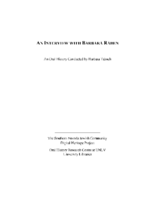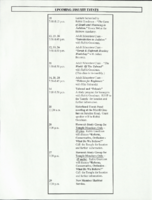Search the Special Collections and Archives Portal
Search Results

Transcript of interview with Barbara Raben by Barbara Tabach, February 24, 2015
Date
Archival Collection
Description
Interview with Barbara Raben by Barbara Tabach on February 24, 2015. In the first part of the interview Raben discusses her involvement with Hadassah in Southern Nevada, and the various groups within that organization. During the second part of the interview, she talks about her family and her relationship to Judaism, and moving to Las Vegas in 1991. Raben discusses the business she built in Los Angeles and Las Vegas called the Candy Factory. She then talks about the formation of Midbar Kodesh with other families from Temple Beth Sholom. Raben continues to be involved in the Jewish community and the Jewish Family Service Agency.
In 1945, Barbara Raben was born to Kermit and Adele Shulman, children of Eastern European emigrants. She enjoyed a happy childhood in Stamford, Connecticut, and was raised with a strong Jewish identity. After attending college in New Jersey, Barbara married Richard Grisar, and the couple lived in London for a year, before returning to Stamford. In 1975, Barbara and Richard moved to Los Angeles where Barbara owned and operated a very successful candy business, Candy Factory. Sixteen years later, Barbara sold her business, and the family relocated permanently to Las Vegas, where her husband owned radio stations. Barbara has always been an active member of the Jewish community, wherever she lived, giving her time to synagogue, children's day school and service organizations. Upon arriving in Las Vegas, Barbara and her family were members of Temple Beth Sholom, before leaving the congregation to start Midbar Kodesh Temple with a small group of other families. She has been an active member of Hadassah Southern Nevada Chapter for over a decade, helping rebuild the organization locally after participating in the Hadassah Leadership Academy, a program designed to engage a younger generation of members. Currently, Barbara serves as board president and interim executive director for Jewish Family Service. In 2004, then a widow, she married Terry Raben. Barbara has four sons with her first husband: Michael, Andrew, David and Marc Grisar.
Text

Transcript of interview with Henry Kronberg by Barbara Tabach, February 26, 2015 and April 13, 2015
Date
Archival Collection
Description
Interview with Henry Kronberg by Barbara Tabach in two sessions, February 26 and April 13, 2015. In the first session Kronberg talks about his childhood in Germany and Poland and his experience being imprisoned by the Gestapo, and transported to a concentration camp. He survived the Holocaust and met his wife, and they moved to the United States in 1946. He discusses being reunited with his sister in Las Vegas after decades of searching, and moved his family to Las Vegas in 1962. Kronberg talks about becoming involved with Jewish life here, and his wife, Lillian's involvement at Temple Beth Sholom. In the second session, Kronberg discusses purchasing Stoney's, a loan and pawn shop, including some of the clientele and merchandise. He also discusses other social and environmental concerns like anti-Semitism and water resources in Southern Nevada.
Henry Kronberg was born in 1920 and spent his early childhood in a town on the border of Poland and Germany, about 40 miles from Krakow. For years he felt uncomfortable telling his story of surviving the Nazi concentration camps of World War II. Today his name is linked to the Sperling Kronberg Mack Holocaust Resource Center in Las Vegas. And in his soft-spoken manner, Henry recalls his ordeal of loss of family and survival during this most heinous of situations through backbreaking labor and ingenuity. At the end of the war, Henry met the love of his life, Lillian, also a survivor. The two married in 1946 in Frankfurt and immigrated to New Jersey where she had relatives. He describes their difficulties and the various jobs he held until becoming an excellent baker. Then in 1962 an interesting choice took him to a bar mitzvah in Canada. While there the dinner conversation lead him to a great discovery?his sister Lala had survived and was living in Las Vegas. Soon he moved his wife and daughter to Las Vegas. His first foray into business was with his brother-in-law. However, soon it was important to be independent and to control his own destiny. He purchased a going concern, Stoney's Pawn Shop, from Dr. Alexander Coblentz, one of the city's first doctors. He became the fourth owner of Stoney's and operated it until selling it to Steven Mack in 1998. Henry and his wife were active in the Jewish community. They joined Temple Beth Sholom and became fast friends with many of the early leaders of Las Vegas and became a respected member of the secular and Jewish communities.
Text

Transcript of interview with Phyllis Friedman by Barbara Tabach, March 2, 2015
Date
Archival Collection
Description
In this interview, Phyllis Friedman reflects upon her extensive work with the ADL in Las Vegas. She discusses the city?s relatively low anti-Semitic activity, and how this allowed the Las Vegas ADL office to focus its efforts more broadly than in other cities. She also touches upon her family history, and how the community of Las Vegas has evolved since first visiting in 1963.
A Chicago native, Phyllis Friedman first came to Las Vegas in 1996 to become the Jewish Federation of Las Vegas? first foundation director. After two years, Friedman moved to year Los Angeles to work for ORT. Itching to get back to Las Vegas, in 2007, Friedman returned to the city to became director of the Nevada regional office of the Anti-Defamation League (ADL). In this position, she worked with schools as well as law enforcement, including the Federal Bureau of Investigation (FBI), teaching about tolerance and justice. She is a recipient of the FBI?s Las Vegas Division Director?s Community Leadership Award as well as the first awardee of Jewish Federation?s Jewish Professional of the Year. Three weeks into retirement, Friedman gave this interview, reflecting upon her extensive work with the ADL in Las Vegas. She discusses the city?s relatively low anti-Semitic activity, and how this allowed the Las Vegas ADL office to focus its efforts more broadly than in other cities. She also touches upon her family history, and how the community of Las Vegas has evolved since first visiting in 1963.
Text

Transcript of interview with Irwin Kishner by Claytee D. White, September 10, 2013
Date
Archival Collection
Description
Irwin Kishner (1933 ? 2017) was a noted real estate developer, attorney and longtime community leader. In this oral history interview conducted in 2013, he briefly shares his childhood growing up Jewish in Brighton Beach area of Brooklyn, New York. He often speaks of himself in the third person, as he brings to life his roots, his family?s move to Miami where he graduated from high school and the tale of his relocation to Las Vegas to work with his uncles Herman and Maury Kishner. He describes his entrance to Las Vegas as that of a bon vivant. And truly, Irwin, fell in love with the city from the moment he arrived in 1960. Irwin was a graduate of University of Florida (1954) and University of Miami Law School (1958). Both his daughters, Sharon and Joanna, were born in Las Vegas and he reminisces about becoming a Jewish bachelor father to them. In June 2013, shortly before this interview, Irwin celebrated his 80th birthday. He was a proud father, grandfather and energetic businessman who left an indelible mark on everyone he knew. As a developer, he was known for the Somerset Apartments, Somerset House Motel, Somerset Gardens apartment complex, and the Somerset Shopping Center. He enjoyed reflecting on the many community organizations he dedicated himself to, from the Las Vegas Convention and Visitors Authority to Opportunity Village to the original Las Vegas Rotary Club to the Community Concert Association?and that?s just to mention a few.
Text

Transcript of interview with Walter Weiss by Claytee White, November 2, 2010
Date
Archival Collection
Description
In this interview, Walter Weiss discusses how Judaism and boxing kept him out of trouble in his youth. Weiss grew up in the Boston area, and started boxing as a teenager. Weiss talks about his boxing training, becoming a runner for a bookmaker, and coming to Las Vegas in the 1950s to be a bookmaker for the Stardust Hotel, and working the slot machine floor. He had several different jobs in various casinos, and discusses different people involved in the gaming industry in Las Vegas.
Walter Weiss life story begins in a Malden, Massachusetts during the Great Depression. His early background was a blend of observant Judaism, secularism, and the effects of the era. He was a troubled youth whose older brother encouraged him to join him in boxing. As Walter explains: I was a wild kid and ... boxing saved my life. His aptitude for boxing led him to be a sparring partner in New York City's famous Spillman Gym. There he met and worked out with some of the greatest fighters of the era, including Rocky Marciano. He recalls how he turned professional while attending the University of Miami and how he first came to Las Vegas in 1958 to escape his personal troubles and find work with a local bookmaker. Thus began his diverse employment history in the casino industry. He details his various positions and the cast of famous and infamous characters of the times. For six years he return to New York and worked as a Wall Street broker before arriving back in Las Vegas in 1973. He talks about his property ownership, lobbying for an amendment to Senate Bill 208, his personal religious changes and a sundry of observations about the changes that occurred as the state took over gaming.
Text

Transcript of interview with Gary Sternberg by Barbara Tabach, February - April, 2015
Date
Archival Collection
Description
In this oral history, Gary explains how the family came to live in the United States?Cleveland and Los Angeles. In 1957, he married Noreen and they eventually came to live in Las Vegas where Gary worked for Sears selling washing machines, had a repair business and an importing business with Noreen. Gary was an entrepreneurial soul and inventive much like his father. He owns three patents.
On August 25, 1931, Augusta and Herman Sternberg welcomed their second child, Gerd (aka Gary), into the world of Cuxhaven, Germany. Augusta was a devout Christian of Polish ancestry who had fled Russian persecution. Herman was a German-born Jew salesman and inventor. The couple fell in love and had two children, Gary and Ruth who was a year and half older. By 1938, German politics were targeting Jews and Herman was ripped away from his Christian wife and children and sent to a concentration camp. Fate and friendship rescued Herman with the option to go to China. And so begins the history of the Sternberg family and how they all would eventually live together during World War II in the confines of a Jewish ghetto in Hongkew, China from May 1939 to July 1948. Gary had an extraordinary career as a dealer. He was not the stereotypical young dealer-to-be: he was in his 40s when he signed up for the Michael Gaughn Dealing School in the mid-1970s. Gary?s charming wit and ease of making friends soon gained him a position at El Cortez and then Caesars Palace. It was the same personality that would sustain his stellar thirty-one year career at Caesars. He was employed there from April 1974 until his retirement May 8, 2005. Though Jewish tradition would identify Gary as Christian, he self-identified as Jewish, officially converted and has been an active member of the Jewish community. Among his anecdotes-and he has many-is one about securing a $30,000 donation from Frank Sinatra and Jilly Rizzo for Congregation Ner Tamid.
Text

Transcript from interview with Mike Unger by Barbara Tabach, January 21, 2016
Date
Archival Collection
Description
In this interview, Unger reflects upon his long and successful career in hotel management in Las Vegas and also in Arizona and Pennsylvania. He shares stories as a local celebrity, particularly in the 1970s and 1980s when he worked at Caesars Palace, as well as the big projects he oversaw, including organizing the first big fight nights, World Series of Tavern Poker and Grand Prix race. He talks about working with Morris Shenker, Moe Dalitz, Cliff Perlman and Billy Weinberger, and the role of the Jewish community in the city, and specifically in the gaming industry. Unger also discusses his non-gaming industry ventures which have included a satellite communications business and a bagel business.
Mike Unger was born in Queens, New York in 1947, and spent most of his childhood in Long Island, growing up in a predominantly Jewish and Italian community. As a young adult, Unger was already working hard, running one of his family?s restaurant after school. When he was in high school, his family moved to Los Angeles to accommodate his father?s health needs, and eventually end up in Las Vegas by 1967. Over the next two decades, Unger would work at nine properties in the city. Unger is one of the University of Nevada, Las Vegas? first hotel management graduates, and started his career with Summa Corporation in its management training program at the Frontier Hotel and Casino. After a brief stint at the Airport Marina Hotel in Los Angeles in 1972, Unger returned to Las Vegas, serving in management capacities at the Aladdin Hotel and Casino, Summa Corporation headquarters and Landmark Hotel and Casino. In 1978, he joined Caesars Palace Hotel and Casino management team, and was integral in creating the city?s first large boxing events, the World Series of Tavern Pool, and the Grand Prix race. Unger also ran properties for the White Mountain Apache and Colorado River Indian Tribes in Arizona, as well as the Showboat Hotel and Casino. In this interview, Unger reflects upon his long and successful career in hotel management in Las Vegas and also in Arizona and Pennsylvania. He shares stories as a local celebrity, particularly in the 1970s and 1980s when he worked at Caesars Palace, as well as the big projects he oversaw, including organizing the first big fight nights, World Series of Tavern Poker and Grand Prix race. He talks about working with Morris Shenker, Moe Dalitz, Cliff Perlman and Billy Weinberger, and the role of the Jewish community in the city, and specifically in the gaming industry. Unger also discusses his non-gaming industry ventures which have included a satellite communications business and a bagel business.
Text

Transcript of interview with Maurice "Maury" Halfon Behar by Barbara Tabach, March 14, 2016
Date
Archival Collection
Description
In this interview, Behar reflects upon his childhood in France, and later adjusting to life in New York. He talks of his admiration for those that have cared for him in his youth, including Marie Cazous and his parents, Marco and Flora Behar. He details his career path, and how he ended up in Las Vegas. In addition, Behar describes a recent family trip to France, visiting his place of birth for the first time since leaving as a child.
Text

Transcript of interview with Dr. Leonard Kreisler by Barbara Tabach, May 23, 2016
Date
Archival Collection
Description
Dr. Leonard Kreisler, MD, was born August 3, 1930 in Brooklyn to post World War I European Jewish immigrants. Raised in the smaller community of White Plains, New York, he worked happily by his father?s side. The elder Kreisler was a cabinet maker and carpenter, who Len describes as fiercely independent. Young Len keenly helped his Yiddish language father write his contracts and guided him to increasing his prices. At an early age, Len knew that he would become a medical doctor?little did he know what an amazing life was in his future. It was while attending the University of Vermont, College of Medicine that Len met his wife Joan. They married in June 1957. Joan became a teacher and later a real estate agent while in Las Vegas. This interview includes stories about his medical education and his thirteen year private medical practice in Peekskill, New York. This was followed by a career in occupational medicine and over seventeen years as the Medical Director at the Nevada Test Site for Reynolds Electric and Engineering Corporation (1973 ? 1990). During that time he was also elected Chief of Staff at University Medical Center (UMC) for two years and helped create the Children?s Miracle Network Telethon and the UMC Foundation. When he recalls moving to Las Vegas, his memories include jogging by Temple Beth Sholom and joining a minyan. He became a congregation vice president. When his career at the Test Site was halted, his medical adventure led him to be a maritime physician for a cruise liner. He also ran twice for Clark County Commissioner against Thalia Dondero. Dr. Kreisler is the author of several books: Death by Any Means (2005); Roll the Dice, Pick a Doc and Hope for the Best (2009); The Codes of Babylon (2010); Shortfall (2011); The Obligated Volunteer (2014) and In Bed Alone, A Caregiver?s Odyssey (2016).
Text

Minutes from Temple Beth Sholom Board of Directors meetings, 1998
Date
Archival Collection
Description
Meeting minutes include reports from committees of the board, correspondence, and balance sheets.
Text
